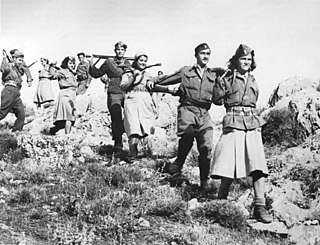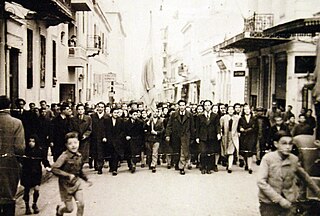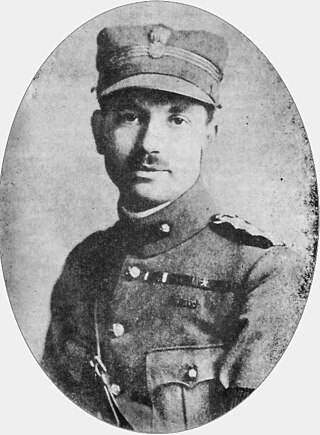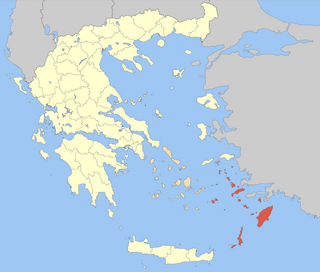| |||||
| Decades: | |||||
|---|---|---|---|---|---|
| See also: | Other events of 1943 List of years in Greece | ||||
This is a list of events that happened in 1943 in Greece.
| |||||
| Decades: | |||||
|---|---|---|---|---|---|
| See also: | Other events of 1943 List of years in Greece | ||||
This is a list of events that happened in 1943 in Greece.

The Greek People's Liberation Army was the military arm of the left-wing National Liberation Front (EAM) during the period of the Greek resistance until February 1945, when, following the Dekemvriana clashes and the Varkiza Agreement, it was disarmed and disbanded. ELAS was the largest and most significant of the military organizations of the Greek resistance.

The Greek resistance involved armed and unarmed groups from across the political spectrum that resisted the Axis occupation of Greece in the period 1941–1944, during World War II. The largest group was the Communist-dominated EAM-ELAS. The Greek Resistance is considered one of the strongest resistance movements in Nazi-occupied Europe, with partisans, men and women known as andartes and andartisses, controlling much of the countryside prior to the German withdrawal from Greece in late 1944.
National and Social Liberation was a Greek Resistance movement during the Axis occupation of Greece. It was founded in autumn 1942 by Colonel Dimitrios Psarros and politician Georgios Kartalis.

The military history of Greece during World War II began on 28 October 1940, when the Italian Army invaded Greece from Albania, beginning the Greco-Italian War. The Greek Army temporarily halted the invasion and pushed the Italians back into Albania. The Greek successes forced Nazi Germany to intervene. The Germans invaded Greece and Yugoslavia on 6 April 1941, and overran both countries within a month, despite British aid to Greece in the form of an expeditionary corps. The conquest of Greece was completed in May with the capture of Crete from the air, although the Fallschirmjäger suffered such extensive casualties in this operation that the Oberkommando der Wehrmacht abandoned large-scale airborne operations for the remainder of the war. The German diversion of resources in the Balkans is also considered by some historians to have delayed the launch of the invasion of the Soviet Union by a critical month, which proved disastrous when the German Army failed to take Moscow.

The Security Battalions were Greek collaborationist paramilitary groups, formed during the Axis occupation of Greece during World War II in order to support the German occupation troops.

The occupation of Greece by the Axis Powers began in April 1941 after Nazi Germany invaded the Kingdom of Greece in order to assist its ally, Italy, in their ongoing war that was initiated in October 1940, having encountered major strategical difficulties. Following the conquest of Crete, the entirety of Greece was occupied starting in June 1941. The occupation of the mainland lasted until Germany and its ally Bulgaria withdrew under Allied pressure in early October 1944, with Crete and some other Aegean islands being surrendered to the Allies by German garrisons in May and June 1945, after the end of World War II in Europe.

The Battle of Leros was a combat over the Greek island of Leros between the Allies defending it and invading forces of Nazi Germany waged between 26 September and 16 November 1943. Regarded as the central event of the Dodecanese campaign of the Second World War, the term is widely used as an alternative name for the whole campaign. After the Armistice of Cassibile the Italian garrison on the Greek island Leros was strengthened by British forces on 15 September 1943. The battle began with German air attacks, continued with the landings on 12 November, and ended with the capitulation of the Allied forces four days later.

Dimitrios Psarros was a Greek army officer, founder and leader of the resistance group National and Social Liberation (EKKA), the third-most significant organization of the Greek Resistance movement after the National Liberation Front (EAM) and the National Republican Greek League (EDES). In 1944, he was executed by Greek communist forces.

The Dodecanese campaign was the capture and occupation of the Dodecanese islands by German forces during World War II. Following the signing of the Armistice of Cassibile on 3 September 1943, Italy switched sides and joined the Allies. As a result, the Germans made plans to seize control of the Dodecanese, which were under Italian control. The Allies planned to use the islands as bases to strike against German targets in the Balkans, which the Germans aimed to forestall.

The Battle of Kos was a brief battle in World War II between British/Italian and German forces for control of the Greek island of Kos, in the then Italian-held Dodecanese Islands of the Aegean Sea. The battle was precipitated by the Allied Armistice with Italy. German forces with strong air support quickly overwhelmed the Italian garrison and the recent British reinforcements, denying the Allies a base to attack the German presence in the Balkans and leading to the expulsion and death of the island's Jewish population.

Athanasios Klaras, better known by the nom de guerreAris Velouchiotis, was a Greek journalist, politician, member of the Communist Party of Greece, the most prominent leader and chief instigator of the Greek People's Liberation Army (ELAS) and the military branch of the National Liberation Front (EAM), which was the major resistance organization in occupied Greece from 1942 to 1945.

The Sacred Squadron was a Greek special forces unit formed in 1942 in the Middle East, composed mostly of Greek officers and officer cadets under the command of Col. Christodoulos Tsigantes. It fought alongside the SAS in the Western Desert and the Aegean, as well as with General Leclerc's Free French Forces in Tunisia. It was disbanded in August 1945 but is the precursor to the modern Special Forces of the Hellenic Army.

This is a timeline of events that occurred during World War II in 1943.
The 4th "Ali Demi" Battalion was a battalion under the 15th Regiment of Greek People's Liberation Army, founded during the Second World War. It comprised both from Cham Albanians and Greeks, of the region of Epirus and was established in May 1944.

The 50th Infantry Division "Regina" was an infantry division of the Royal Italian Army during World War II. The Regina was formed on 1 March 1939 in the Italian Islands of the Aegean and entitled to the Queen. After the announcement of the Armistice of Cassibile between Italy and the Allies on 8 September 1943 the division fought Wehrmacht forces in the Battle of Rhodes. The majority of the division surrendered on 11 September 1943, while the III Battalion, 10th Infantry Regiment "Regina" resisted the Germans on Leros until 16 November 1943.

Georgios Kartalis was a Greek politician.

The Greek Civil War took place from 1946 to 1949. The conflict, which erupted shortly after the end of World War II, consisted of a Communist-led uprising against the established government of the Kingdom of Greece. The rebels declared a people's republic, the Provisional Democratic Government of Greece, which was governed by the Communist Party of Greece (KKE) and its military branch, the Democratic Army of Greece (DSE). The rebels were supported by Albania and Yugoslavia. With the support of the United Kingdom and the United States, the Greek government forces ultimately prevailed.
The National Bands Agreement was an agreement concluded on 5 July 1943 at the village of Liaskovo, between the British military mission to occupied Greece and the three main Greek Resistance organizations, EAM-ELAS, EDES and EKKA. Its aim was to coordinate the actions of the Resistance movement in Greece, including the establishment of a joint headquarters under the aegis of the British GHQ Middle East.
Red Terror is a term used by some historians to describe incidents of violence against civilians that were considered "traitors" by EAM, because these civilians allegedly collaborated with groups that wanted Greece to be under the political, economic and military influence of other foreign forces; either of Axis powers, from 1943 to 1944 or under British influence, from 1943 to 1949 and during the Greek Civil War. In the countryside, operations were conducted by the ELAS; in cities, by the Organization for the Protection of the People's Struggle (OPLA).